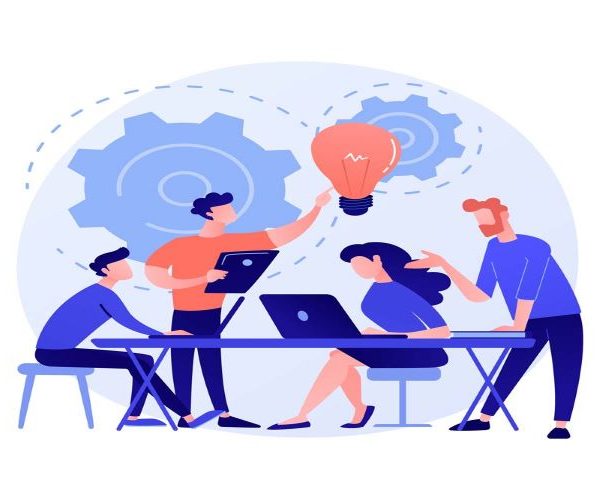HOW TO TALK ABOUT YOUR FAVOURITE BOOK

Am I doing this right?
All of us have read books, right? Whether we’re avid bookworms or casual readers, we all have that one book that we absolutely love. But, if there’s one thing we love even more than reading the book, it’s talking about it. Sometimes though, we all face problems when trying to accurately convey exactly what we’re trying to say. Read on to learn exactly what to say, to make your conversational partner understand exactly what it is that makes the book you love, so interesting. Happy learning!
So, let’s start by taking a basic situation that all of us can relate to, and work from there.
“You’ve read a book that you unequivocally* adore, and can’t wait to tell your friend about it.”
Read on to find the overall flow, specific vocabulary, phrases, and expressions that can be used for an effective and fluent conversation on this topic. Right below is your guide to having an engaging conversation!
A conversation has specific phases that it goes through.
Content : What is it that you are going to talk about?

Use the wh questions along with the keywords to help you put together the content.
1. Where did you get the book from? – Barnes & Nobles, Crossword, StarMart etc.
2. How did you come across the book? – A friend’s gift, an accidental find, mother’s old book etc.
3. What was your favorite part of the book? – Climax, The scene where the protagonist died, the denouement etc.
4. Who is your favourite character? – Protagonist, Antagonist, Love interest, Main character’s little sister etc.
5. What do you like about character X? – Bravery, Charm, Beauty, Heroism etc.
Choosing Contextual Vocabulary
Choosing contextual vocabulary to suit the scenario you’re talking about can be very important when it comes to giving depth and clarity to what you’re trying to say, as well as piquing* your partner’s attention. In this case, you’re talking about a book you like.
Listed below are a few words and phrases that could come in handy while elaborating on the book. Additionally, the meanings of a few starred (*) words are given at the end of this article that you could also use!
1. Plotline
2. Climax
3. World-building
4. Anti-hero
5. Antagonist (villain)
6. Denouement*
7. Dialogue
8. Descriptions
9. Prologue*
10. Epilogue*
11. Plot Twist
12. Love interest
13. Author
14. Pseudonym*
15. Genre
Similarly. given below are a few descriptive words and phrases that you could use to make your conversation more interesting!
1. Three-dimensional characters
2. Detailed world-building
3. Intriguing plotline
4. Unanticipated plot twist
5. Great chemistry between characters
6. Interesting genre
7. Talented author
8. Realistic dialogue
9. Riveting* climax
10. Well-written anti-hero
11. Conflicting interests
12. Disappointing plot-holes*
13. Imaginative descriptions
14. A fast-paced read
15. Likeable villain
Organizing the Content : Putting it all together to create a comprehensive picture
Now that we know what to talk about and the words to use, let us put them in a logical order.
Initiate the conversation by talking about a new book you discovered.
So I came across a book recently, called ‘Fairytale’, while I was at Barnes and Nobles the other day.
Express your excitement over the book – this could be why you brought the book into the conversation.
It was a wonderfully fast-paced* book with constant plot twists that kept me on edge the entire time.
Talk about why you liked the book – here are 5 examples of things you could say
1. I loved the main character, he was a perfect combination of witty and sarcastic with a dash of good humour.
2. The story was about a knight who saves a princess from a tower, an overdone trope* so I was initially a little skeptical about it, but was completely satisfied by the end.
3. The villain was a very well fleshed out, three-dimensional character with lots of depth and a dark and tragic past which appealed to my sympathetic side.
4. The fictional universe that the story was set in was a very well-built and descriptive universe, the imagery provided was vivid, and transported me into the book without being too florid.*
5. Overall, the book was an action-packed thriller fantasy, with a great sense of chemistry between characters and realistic dialogue that was easy to read and understand.
As you can see, in no particular order, I have included five elements in the above example. It is a skeleton of sorts that you could also use while talking about a book you like. It goes as follows – Protagonist, Antagonist, Plotline, Fictional Universe or Realism and Overall View of the Book. You could also use instances from the book to support your views. For example ‘I think the villain was really misunderstood because…’ or ‘The hero’s wit is particularly highlighted in his exchange with…’.
Tell your conversational partner why you think they should read the book, for example-
1. ‘I think you should read the book because you read a lot of other authors from the same genre’
2. ‘You would love this book because I know you love action-packed thrillers’.
3. ‘I know fantasy isn’t really your cup of tea but I have a feeling you will enjoy this book, it’s different from regular fantasy novels.’
4. ‘You’ve told me you don’t read much but trust me when I say you’re going to love this book, it’s an easy read that you can get through in no time.’
5. ‘You read X’s work right? This is one of her more underrated novels that you absolutely must read.’
A model answer would be as follows :-
I was at Barnes and Nobles the other day, you know the one by 5th Avenue? Yeah, I was there looking for a present for Y’s birthday when I came across this book called ‘Fairytale’. I picked it up and was immediately hooked, and couldn’t put it down again until I was done. The book was action-packed and fast-paced, with unpredictable plot twists that kept me on edge the entire time. The story was about a knight who saves a princess from an ogre. I know it’s an overdone trope, but I found it a refreshing take on the cliche. The main character was so snarky and funny, I loved it. The antagonist, in contrast, was dark and tragic, but I think he was misunderstood, he had a traumatic past. I won’t give anything away though. The fictional universe was pretty well-built and descriptive, realistic enough to constitute a proper society. I was satisfied with it, I hate undeveloped fictional worlds, it takes away the realism. Overall the book was brilliant, the characters had a great rapport* with one another, the climax was splendidly well-written and the denouement was more than pleasing. I recommend that you read this book because I know how much you like fantasy, and this book, in my opinion, is one of the best in the genre.
Meanings of starred (*) words used in the article
1. Unequivocal – Leaving no doubt.
2. Protagonist – Main Character.
3. Feisty – Lively, Determined and Courageous.
4. Penchant – Tendency to do something.
5. Pique – Arouse interest or curiosity.
6. Denouement – The final part of a play, film, or book where the conflict is resolved.
7. Fast-paced – A narrative that moves quickly.
8. Prologue – Introduction
9. Epilogue – A section at the end of the book that acts as a conclusion.
10. Pseudonym – A false pen name that an author writes under.
11. Riveting – Interesting
12. Plot-holes – Inconsistency or gaps in the storyline.
13. Trope – Theme
14. Florid – Excessively descriptive.
15. Rapport – Empathetic relationships between people.





